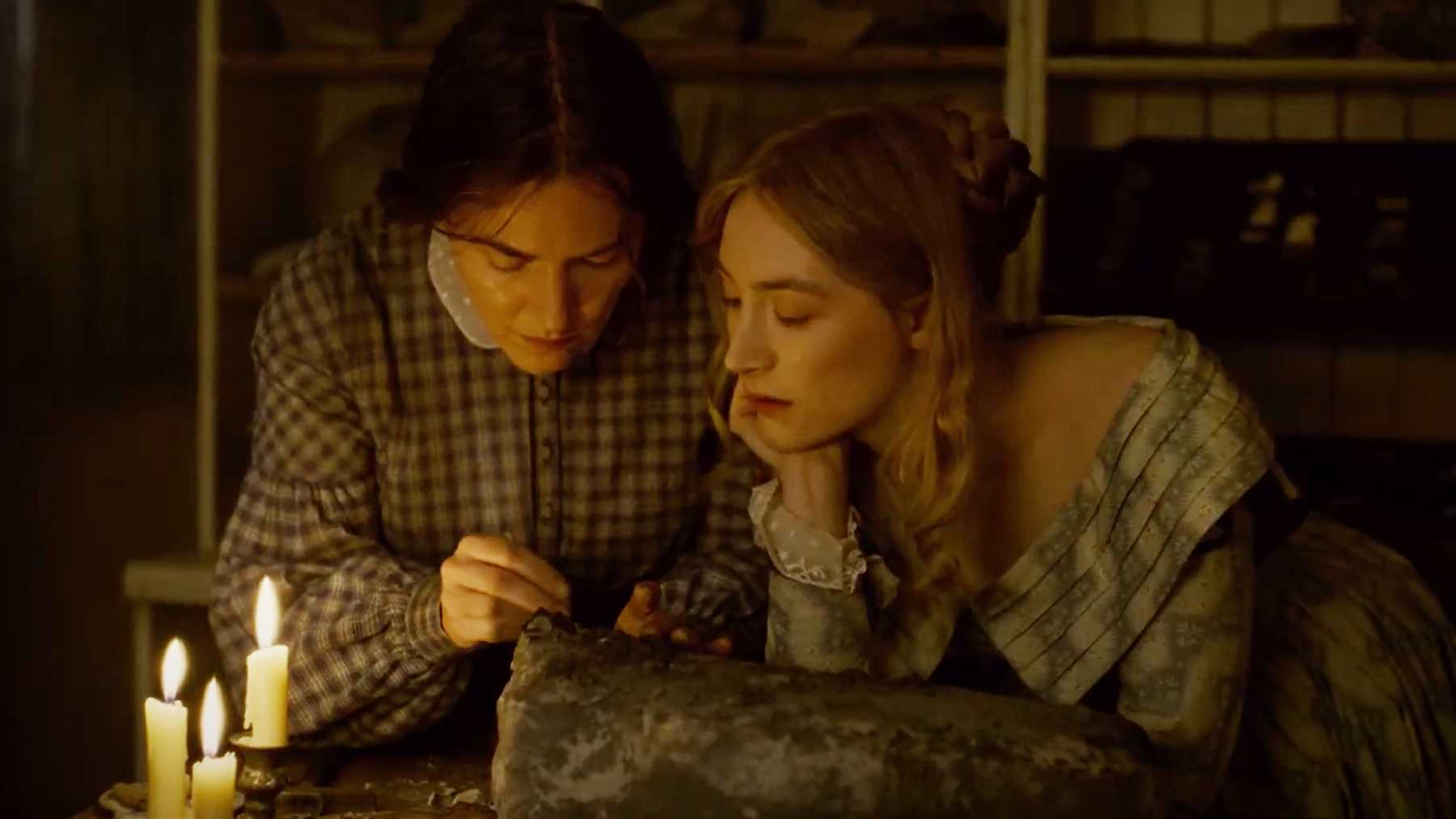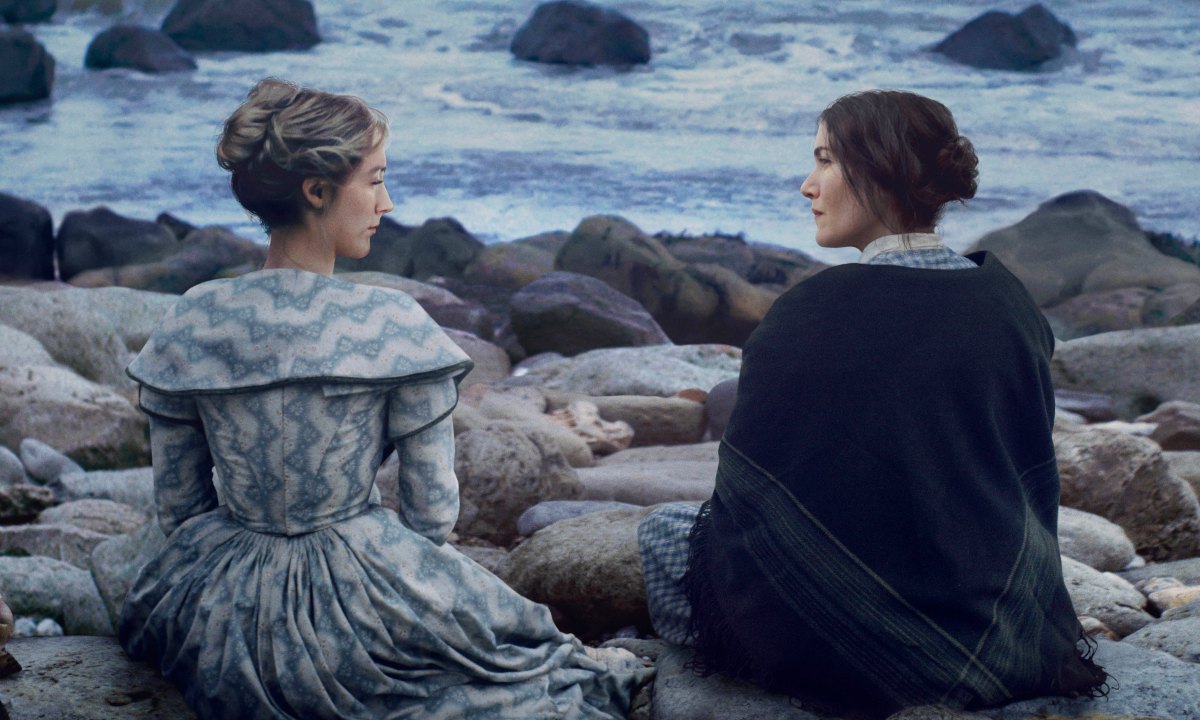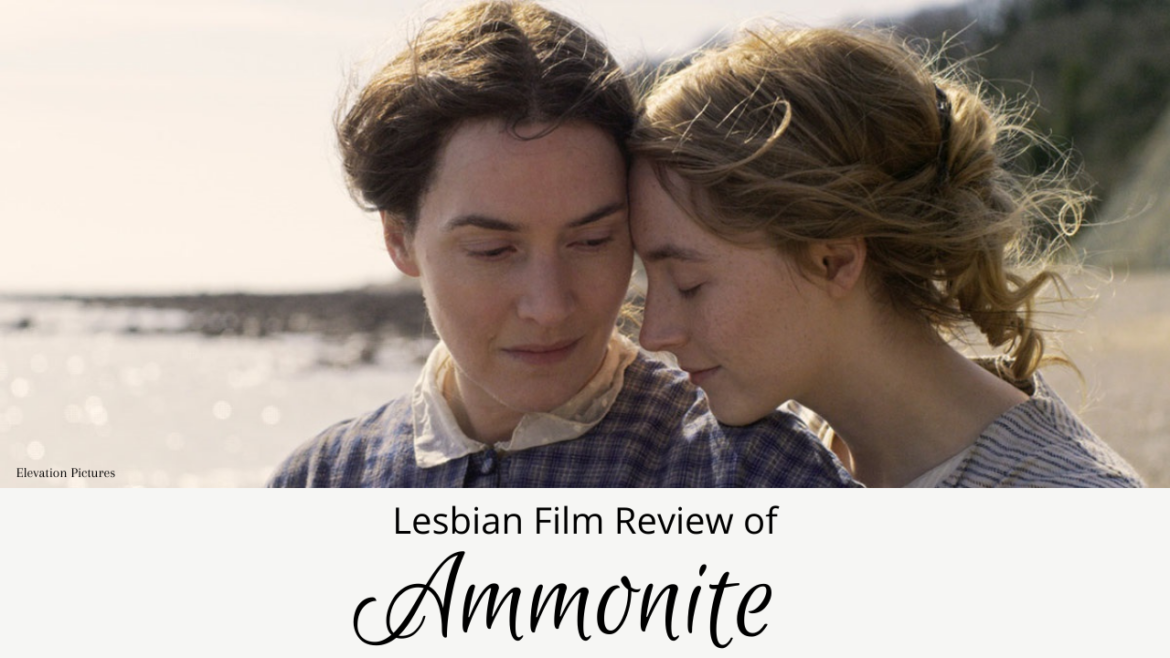2020 was a big year for LGBTQ+ representation in film, and it feels like we are finally starting to see more queer women characters on screen. Ammonite was a very exciting release, as it features two queer women leads played by Hollywood stars Kate Winslet and Saoirse Ronan, and a story we really haven’t seen before. We couldn’t wait to see it! Steph has always really loved Kate Winslet. When she first came out to her mom, her mom told her she had a feeling she was gay, because of all the posters Steph had of Kate Winslet in her room as a teen. Smart mom!
To us, Ammonite is a very important film for the LGBTQ+ community. Written and directed by a queer man named Francis Lee, it tells the very raw story of a romance between two women in the 19th century. A truly layered and beautiful depiction of a queer relationship, it’s one of our favourite LGBTQ+ films that we’ve seen in a long time. We’ve been raving about it ever since we watched it and we have so much to say! Keep reading for a very lesbian review of Ammonite.
Warning! The rest of this review includes spoilers for the film!
Ammonite centres loosely around the story of a real-life palaeontologist from Britain in the 1840s. Mary Anning (Kate Winslet) leads a quiet life in Lyme Regis. She’s a notable fossil collector who lives without a husband, and cares for her elderly mother. Strong, independent, and seemingly quite reserved, Mary appears to be pretty isolated from others. The early scenes of the film are very quiet and slow-moving, with little dialogue. You are transported to seaside England to follow Mary through her daily life. Soon we meet Charlotte Murchison (Saoirse Ronan), a young woman whose husband hires Mary to care for her while he is away on his travels. It is his hope that Charlotte can learn about Mary’s work, and have some companionship while she heals from the personal tragedy of losing a child. The two women initially clash, but soon grow into friends and eventually lovers.

Elevation Pictures
The story of the film is quite minute in scope, and is more about the visceral connection between the two women who lead very different lives. At a time when a woman’s role was predominantly limited to bearing children and keeping the home, Ammonite is a fascinating look at gender, relationships, and social classes in the 1800’s. Like queer period pieces that have come before, we examine a time when the struggles of queer people were very different from the struggles our community faces today. We follow the two characters as they navigate a romance and an affair, and watch the raw attraction and physical connection grow between them. While their relationship mostly lives in secrecy because of the taboo around queerness at the time, their chemistry is completely captivating and beautifully captured. There isn’t massive fear around others finding out about them being together, and it’s refreshing that their story isn’t too tumultuous or traumatic. Mary and Charlotte find companionship in one another, when both of them are heavy with loneliness. Charlotte’s husband seems to offer her little affection or support, and we watch her character transform in the company of Mary while she appears to rediscover herself. On the other hand Mary opens herself up and softens in Charlotte’s presence, breaking down her own walls to finally be vulnerable.
Kate Winslet and Saoirse Ronan both bring incredible life to these characters. The explicit attention to detail and meticulous nature of every decision made by both them and director Francis Lee, really set this film apart. It’s also a really important example of how non-queer actors can play queer characters on screen and make it work. A big debate in film and television right now centres around this very question, should straight performers be cast in queer roles. In our opinion, this topic is so complicated and nuanced, that there really is no simple answer. Is a straight actor playing a queer role that is a flamboyant caricature of a gay person, full of harmful stereotypes? In that case, no, we don’t think it’s really possible for a straight actor to play that role in a way that isn’t offensive and damaging to the LGBTQ+ community. But in Ammonite, both leads are written by a queer person, and done so with such care. The two powerhouse actors bring incredible performing experience to the roles, and they really bring the women to life in a beautiful way. They are both complicated, layered, humanized characters. Their queerness is played delicately, and in a way that (in our opinion) offers some really wonderful representation for our community on screen.

Elevation Pictures
Some of our favourite scenes in Ammonite, have to be the love scenes between the two women. I don’t think we have ever seen such authentic, honest, realistic, and relatable depictions of queer sex in film. They are truly breathtaking. They are passionate in a very real way, and so incredibly vulnerable. Queer women are so used to seeing “lesbian sex” displayed as graphic, gratuitous, and objectifying. This isn’t. We were really blown away by the film’s stunning inclusion of intimacy, pleasure, and sex in a way that we just never get to see. So impressive!
It also feels important to note that while queer love stories in period pieces are always complicated and never seem to have happy endings, nothing about Ammonite feels incredibly tragic. What comes of Mary and Charlotte’s relationship feels honest and realistic for that time, and the story doesn’t feel riddled with sadness the way we so often see. We felt satisfied with where the film went, including its ending. It feels true to both characters and their innate differences as women. Francis Lee’s style is undoubtedly fitting for the story. Full of quiet, intimate moments, the film comes to life through its characters rather than its plot. We fell in love with his raw, visual style of storytelling; every moment of the film was full of intention.
Overall, Ammonite is just remarkable. Driven by powerful characters, the film is an examination of the human condition that explores love, loss, femininity, and queerness. We loved it so much, and it makes us really excited for the future of LGBTQ+ representation in film. It’s a great example of why it’s so important that there are opportunities for queer people behind the camera, and it gives us a lot of hope for more positive representation to come. We highly recommend seeing it!
Have any of you watched Ammonite? What did you think? Let us know in the comments!


